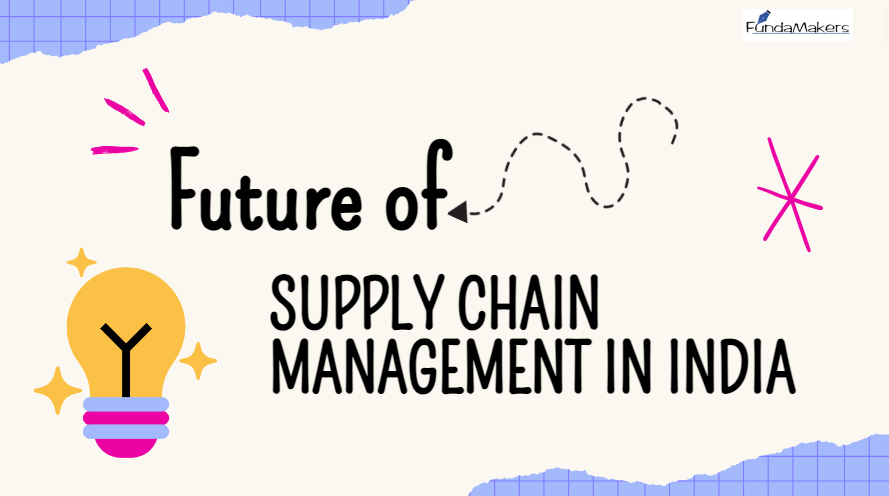India is currently one of the world’s largest consumer marketplaces and economies with the greatest rate of growth. The management of the nation’s supply chain is therefore crucial. The introduction of digital technologies has caused a rapid transformation in India’s supply networks. Supply chains are no different from other corporate operations in that they have been completely digitalised. In recent years, there has been a rapid expansion of information and communication technologies, which has led to the fourth industrial revolution. These technologies are now integrated into supply chains. The competition among organisations is intensified by technological advancements and evolving customer needs.
What is Supply Chain Management?
An MBA in Logistics and Supply Chain Management is a two-year program designed to equip students with the analytical abilities and management techniques necessary to oversee the flow of goods and services. This includes managing inventory, customer service, warehousing, and storage effectively.
In this program, students learn how to streamline operations, optimize logistics processes, and enhance the efficiency of supply chains. They gain insights into handling inventory, improving customer satisfaction, and managing warehouse activities, all of which are crucial for ensuring smooth and cost-effective movement of products from suppliers to consumers.
Career Options After MBA in Supply Chain Management
An MBA in Supply Chain Management opens up diverse career paths, including roles such as supply chain performance analyst, operations manager, quality analyst, strategic sourcing manager, and logistics and transport officer. Beyond these key positions, graduates can also explore consulting roles focused on process improvement and supply chain technology implementation.
Typically, MBA graduates begin in general management positions and later specialize as they gain experience. With career progression, they have the potential to rise to senior roles, such as Vice President of Supply Chain and Logistics, overseeing entire supply chain operations within specific business segments or product categories. In India, the growing emphasis on efficient supply chain management means that opportunities are expanding, offering careers in diverse industries including manufacturing, retail, e-commerce, and consultancy.
Payscale of An Individual After MBA in Supply Chain Management
The skills, knowledge, and experience of supply chain management specialists dictate their pay. The salary range for supply chain management experts is between ₹3,00,000 and ₹20,00,000.
3 Trends Shaping the Future of Supply Chain Management in India
The global and Indian supply chain management industries are changing quickly. It’s reasonable to assume that COVID-19 has significantly impacted practically everything in the wake of the awful events of 2020. Due to shifting lockdowns, school closures, and economic disruptions, many industries have been thrown into disarray, and supply networks worldwide are currently cleaning up the pieces and creating new ground in order to recover.
Digitization
According to experts, efficient digitisation can increase your company’s profitability by streamlining, adapting, and dynamically improving your whole supply chain. If you haven’t made the transition to digital totally yet, be aware that it may not be easy. It is your responsibility to select the right technology for the objectives of your company, install it properly, and fix any internal problems. But most supply chains now include some level of digitisation, and that percentage will only rise in the future. If you are reluctant or unable to digitise your supply chain, third-party logistics in India will not be able to prosper in the future.
Integrated 3PL Services
Integrated Third-Party Logistics (3PL) services refer to a comprehensive logistics solution where a single provider manages and coordinates multiple facets of the supply chain. This integration involves handling a range of functions such as warehousing, inventory management, transportation, order fulfillment, and distribution under one unified system. By consolidating these services, integrated 3PL providers streamline operations, reduce operational complexities, and enhance overall efficiency. They leverage advanced technology and data analytics to optimize supply chain processes, offering clients a cohesive and adaptable logistics solution that can respond swiftly to changing market demands and improve service levels. This holistic approach allows businesses to focus on their core activities while benefiting from improved cost control, scalability, and enhanced supply chain visibility.
Integrated 3PL services provide great potential for numerous organisations as e-commerce continues to rise beyond remarkable levels. Companies are realising this and reacting by acquiring large assets such as freight and truck broking and warehouse facilities to provide comprehensive system integration with customers.
Apart from traditional electronic data interchange, logistics companies are embracing the trends of logistics automation as customers advance in their utilisation of modern technology. This includes utilising API connectors to connect e-commerce websites with fulfilment centres.
Sustainability
More businesses are stepping up their sustainability efforts as more consumers place a premium on environmental responsibility; this has trickled down throughout the supply chain. There are a lot of ways to focus on sustainability, so you’ll need to modify your efforts to suit the needs of your business.
In the coming years, businesses might take more drastic or severe actions to protect the environment. Some may choose to attain zero waste or employ sustainable production methods. On the other hand, businesses might not be able to sustain these sustainability measures in the long run. Your supply chain must be completely redesigned in light of these significant changes, from how you acquire raw materials to how you ship your products to customers.
Read More- Scope of Operations Management in India



